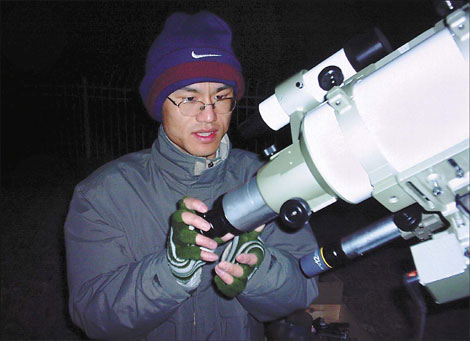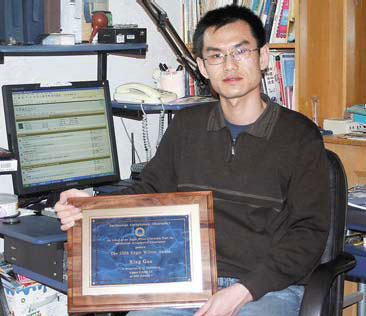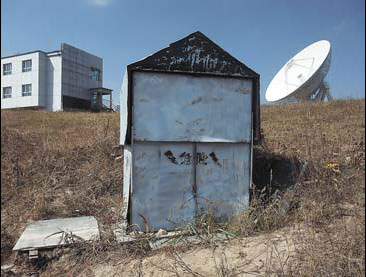Life and Leisure
To infinity and beyond
By Chen Liang (China Daily)
Updated: 2010-10-15 08:19
 |
Large Medium Small |
|
Gao Xing adjusts his telescope at the Nanshan Base of National Astronomical Observatories. Wang Chuanbo / For China Daily |
Physics teacher and comet hunter Gao Xing is one of China's most enthusiastic and successful stargazers, Chen Liang discovers
Gao Xing is a physics teacher by day and a comet hunter by night. The amateur astronomer is one of the country's few comet hunters and one of the best. For the past three years, the teacher at Urumqi No 1 Senior Middle School in Xinjiang Uygur autonomous region has discovered two comets, five novas and a potential supernova.
Comet C/2008 C1 (Chen-Gao), discovered by Gao Xing and Chen Tao, another comet hunter from Jiangsu, was the only new comet recorded by amateur astronomers, in 2008.
P/2009 L2 (Yang-Gao), which he found with Yang Rui from Hangzhou, Zhejiang province, on June 15, 2009, was one of four comets discovered by amateur astronomers that year.
Because of the two discoveries, he became the only mainland Chinese person to win the Edgar Wilson Award twice. The annual prize of $20,000 (134,000 yuan) split among the award winners, is given to amateur astronomers who use amateur equipment and have discovered one or more new comets.
The 36-year-old didn't make his discoveries the old-fashioned way - peering through a telescope at night, hunting for faint smudges that no one had seen before.
Instead, he has his own observatory, built in 2006, which is the first of its kind in the mainland. Located at Nanshan Base of National Astronomical Observatories, about 70 km south of Urumqi, his automated, computer controlled telescopes and cameras have been scanning the sky in a relentless search for near-Earth asteroids, novas, supernovas and comets.
"My observatory is running three sky-scanning programs," the lanky, bespectacled teacher says. "They are sky survey nova, supernova and comet search programs."
Sitting in his room in Urumqi, the science enthusiast can monitor and control remotely three sets of equipment, comprising telescopes, telephoto lenses and digital cameras, all housed in two small huts at the base.
The computers control the cameras to take pictures of the sky automatically and send them to his computer at home. He uploads the photos to his online discussion group, where dozens of his stargazing buddies in other parts of the country are waiting.
"They help me analyze and handle these pictures," he says. "This is real systematic team work."
His love of stargazing was nurtured by the beautiful Urumqi night skies of his childhood. He was head of the astronomy club at college and after graduating he befriended some of the region's best amateur stargazers, including Zhou Xingming (1965-2004).
Zhou was one of the most successful SOHO comet hunters, with 63 SOHO comet and a comet discovery to his credit. (SOHO is an acronym for the Solar and Heliospheric Observatory, a joint international mission that was launched in Florida, 1995, to study the sun and its vicinity. SOHO's coronographs have catalogued over 1,000 comets, known as SOHO comets.)
After Zhou's death in a car accident in 2004, Gao Xing decided to start comet hunting on his own.
"I want to fulfill his wish of Chinese naming more comets," he says.
He named his observatory "Xing Ming".
The journey of discovery has been full of challenges.
To build the observatory, he needed to have moving roofs, adjust three sets of equipment and write computer programs so they could be operated remotely.
After the observatory was up and running there was a time when a computer at Nanshan went down in the evening, so the next day he had to catch a bus to the base.
"What I needed to do was just go there and turn the computer off and then turn it on again. But it costs me a whole afternoon."
Another summer night, rain was forecast and he needed to close the sliding roof, but it got stuck.
He had to call his friends near the base, who climbed on the roof and closed it by hand.
"One hour of rain on the equipment would destroy my observatory," Gao says, adding it would have cost more than 200,000 yuan to replace the equipment.
The journey of discovery has also been a tedious one at times.
"I usually go home, have a quick dinner and then sit in front of a computer till midnight," he says. "In the past month, I have been going to bed at 4 or 5 in the morning to adjust the equipment for the approaching winter."
The adjustments can't be made when it's freezing as "the wires become too brittle". Winter's cold, clear nights are the best for stargazing.
It takes him hundreds of hours scanning the sky to find an unknown comet, but Gao says he's one of the luckiest comet hunters.
"You are not just competing with other comet hunters all over the world for a comet discovery. You are racing against time."
On the evening of Feb 2, 2008, when Chen Tao told Gao Xin that he and another comet hunter said they had seen something of interest, the race was on.
Gao tracked the suspected comets for more photos, Chen adjusted the photos in Photoshop, and they checked comet databases and websites to make sure "the moving object" was neither digital noise nor a known comet. Then they determined the coordinates to report its position.
After checking further data they realized that they had stumbled onto an unknown comet and reported their discovery to the Central Bureau for Astronomical Telegrams and the Minor Planet Center (MPC), under the International Astronomical Union.
"About half an hour later, we found our report was listed on the MPC's NEO (Near-Earth Objects) Confirmation Page," Gao recalls. "That meant our discovery went through the MPC experts' review and was officially listed for further confirmation."
Another Chinese comet hunter disclosed the discovery on Comet Mail List Yahoo, then comet hunters around the world started tracking the new comet. At noon on Feb 3, the discovery was officially confirmed and named.
"I felt like I had won the lottery," Gao says. "I didn't sleep for 24 hours in the race for the discovery."
He jokes that the only thing he misses, as a comet hunter, is sleep.
"Only on rainy days can I have a normal dinner with my family and go to bed before midnight," he says.
|
Gao Xing with his 2008 Edgar Wilson Award. Provided to China Daily |
|
This tin hut in Nanshan houses one of Xing Ming Observatory's three sets of stargazing equipment. Wang Chuanbo / China Daily |


